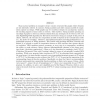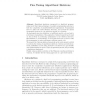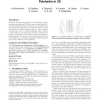359 search results - page 55 / 72 » The Parameterized Complexity of Counting Problems |
IPL
2002
13 years 7 months ago
2002
One of the main reasons for using parallel evolutionary algorithms (PEAs) is to obtain efficient algorithms with an execution time much lower than that of their sequential counter...
IGPL
2010
13 years 6 months ago
2010
Researchers studying complex cognition have grown increasingly interested in mapping symbolic cognitive architectures onto subsymbolic brain models. Such a mapping seems essential...
BIRTHDAY
2010
Springer
13 years 8 months ago
2010
Springer
Many natural problems in computer science concern structures like graphs where elements are not inherently ordered. In contrast, Turing machines and other common models of computa...
EUROPAR
2007
Springer
14 years 1 months ago
2007
Springer
Abstract. Algorithmic skeletons correspond to a high-level programming model that takes advantage of nestable programming patterns to hide the complexity of parallel/distributed ap...
COMPGEOM
2004
ACM
14 years 1 months ago
2004
ACM
We prove that the lines tangent to four possibly intersecting convex polyhedra in 3 with n edges in total form Θ(n2 ) connected components in the worst case. In the generic ca...



